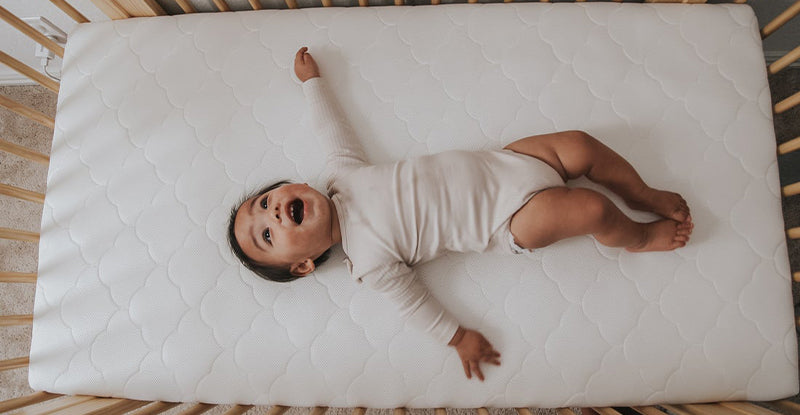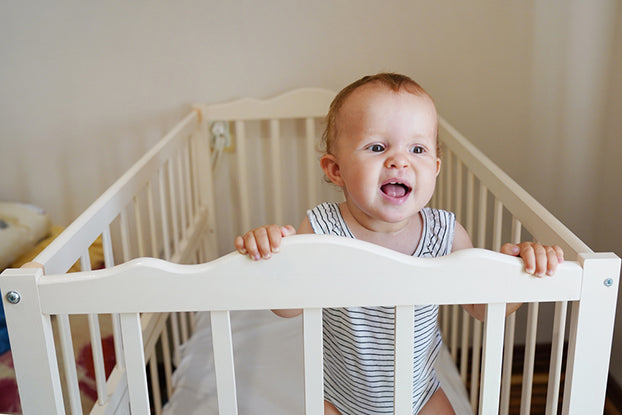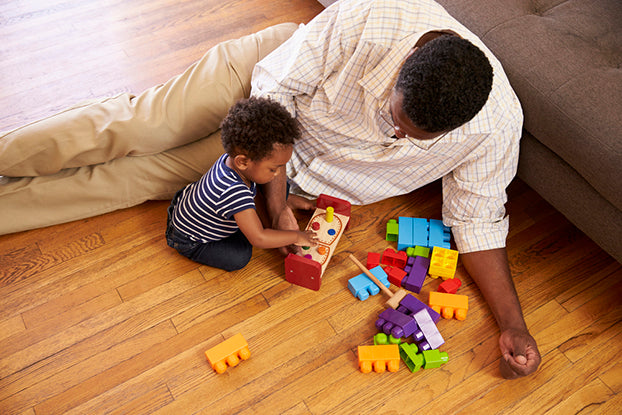10-Month Sleep Regression: Signs, Causes, and How To Cope

Just when you thought you had your baby’s sleep schedule down to a science, the 10-month sleep regression hits. And, suddenly, it feels like you’re back to square one.
They’re waking up more often, fighting naps, and driving you crazy with their irritability. What’s that about? Is this behavior normal? And most importantly, how do you cope when you feel like you’re running on fumes?
Don’t worry; we’ve got you covered. In this article, we’ll explore the 10-month sleep regression, including its signs and causes. We’ll also share tips for helping your little one get through this tough phase.
Table of contents
- What is a sleep regression?
- Signs of the 10-month sleep regression
- What causes the 10-month sleep regression?
- How to cope with the 10-month sleep regression
What is a sleep regression?

A sleep regression is like taking a step backward in your baby’s sleep routine. It’s a period when your baby — who had previously been making good progress in the sleep department — suddenly starts having trouble.
They may have a harder time falling asleep, wake up more frequently in the night, or refuse to nap during the day. This regression can happen at different ages and for various reasons.
When do sleep regressions occur?
Unfortunately, the early years of parenthood are full of sleep regressions. The most common ages are:
- 4 months
- 6 months
- 8-10 months
- 12 months
- 18 months
- 2 years
But don’t panic!
It’s easy to get discouraged when you see a list like that and tell yourself it’ll be years before you get some decent sleep. Thankfully, that’s not entirely true.
Your baby should have long stretches of sleep between each regression. And not every baby experiences every regression. Some only have one or two throughout their entire first year of life.
That said, it’s still a good idea to prepare for what’s to come, as each regression can bring its own challenges.
How long do sleep regressions last?
Sleep regressions are temporary and can last anywhere from 2 to 6 weeks. That may seem like an eternity when you’re in the thick of it, but thankfully, it’s not.
Before long, your little one will be back to sleeping all night. And then, you can get some much-needed rest, too.
Signs of the 10-month sleep regression
If your baby has a hard time falling asleep one night, you may just assume they’re overtired or not feeling well. But if this pattern continues for several nights, you may be experiencing sleep regression.
Here are some common signs of the 10-month sleep regression:
- Waking up more than normal during the night
- Struggling to fall asleep at bedtime
- Staying awake at nap time
- Rising early in the morning and refusing to go back to sleep
- Trying to practice new skills in their bed at night
When your baby is awake, you may also notice that they’re crankier than normal. Since irritability is a sign of not getting enough rest, this is just another indicator that they’re going through a rough patch at night.
What causes the 10-month sleep regression?

Your baby isn’t waking at night just to keep you up. They’re most likely going through a major developmental leap, with plenty of brain development happening in the background.
With the brain busy learning new things, it’s hard for your little one to settle down for the night and get some sleep. They’re just so excited!
Here are some of the new skills that could be causing sleep troubles:
- Pulling to stand
- Crawling
- Learning to feed themself
- Waving good-bye
- Playing simple games like patty-cake
Plus, babies often experience separation anxiety at this age. They may wake up in the middle of the night wanting to be close to you or needing reassurance that you’re still there.
In addition to developmental leaps and separation anxiety, your little one may also be experiencing physical discomfort. They may have teeth coming in or be extra-hungry as their body prepares for a growth spurt.
How to cope with the 10-month sleep regression

No matter what’s causing your little one’s sleep regression, there are things you can do to help them (and yourself) get through it.
Start or continue a bedtime routine.
Babies thrive on routines. The predictability of a regular bedtime routine can help your 10-month-old feel more secure and relaxed. These feelings make it easier for them to fall asleep (and stay that way.)
If you already have a bedtime routine, stick to it. If you’re just starting one, keep it simple and consistent with elements like a bath, story, and song.
Begin winding down for bed at about the same time each night, and before long, your baby will know what to expect.
Try a dream feed.
If you suspect hunger is contributing to your baby’s sleep regression, try offering them a dream feed before you go to bed.
To successfully pull off this late-night feeding, you’ll need to pick your baby up while they’re still asleep and offer them a breast or bottle without completely waking them. By the time they’re done eating, they’ll have the nutrients they need to (hopefully) sleep through the night.
Keep the environment calm and quiet during the dream feed. Otherwise, you risk overstimulating your baby and making it harder for them to fall back asleep.
Evaluate your baby’s sleep space.
As you can see in the following nursery tour video, your baby needs a safe, comfortable place to sleep.
Now is a great time to assess your child’s sleep space and make sure it meets their needs. If it doesn’t, consider making some changes to ensure your baby can relax and sleep soundly.
This might include:
- Choosing a breathable mattress from Newton Baby
- Removing any potential hazards from around the crib and making sure the mattress is low enough that your baby can’t fall out if they pull to stand
- Keeping the room at a comfortable temperature
- Running white noise in the background
- Installing blackout curtains to keep the room dark during naps
- Consider using a sleep sack to keep your baby snug while they rest
Creating a room intentionally designed for sleep can make a big difference.
Prioritize rest.
If you’re up late with your little one, try not to spend the time scrolling through social media or doing other tasks that’ll get your mind racing. Instead, use the time to rest, even if you can’t sleep.
Put your feet up and relax in a comfortable chair or on the couch. Consider using this time to meditate or practice deep breathing exercises. This can help calm your mind and body, allowing you to feel more rested even when you can’t get a full night’s sleep.
Here are some other ways to prioritize mental and physical rest during a sleep regression:
- Take a nap during the day
- Use paper plates to reduce your workload
- Say “no” to non-essentials
- Simplify your cleaning routine and meals (just stick to the basics)
- Ask for help
Taking care of yourself is crucial. Remember, you can’t pour from an empty cup. Prioritizing rest and self-care during this time will help you handle this challenging time better.
Add play time to your day.

Give your little one plenty of opportunities to practice their new skills while you’re both awake.
Put them down on the ground or in a play yard, and place a few toys nearby to encourage them to move. Cheer them on as they crawl, transfer items from one hand to another, or pull themselves to stand.
Keeping them active and engaged during the day can help burn off extra energy, making it easier for them to settle when it’s time for bed.
Know that it won’t last forever.
As frustrating as it can be, remember sleep regressions are temporary. While you might feel like you’ll never sleep again, this phase will soon pass.
Try to stay positive and take things one day at a time. It can help to remind yourself that you survived sleepless nights before, so you can certainly do it again.
While you wait for better sleep days to return, try to enjoy the precious moments with your little one. Before you know it, they’ll be back to sleeping all night long, and you may miss the precious late-night snuggles.
Encourage better sleep with Newton Baby.
Don’t let the 10-month sleep regression get you down. With a bit of patience and a comfortable, breathable mattress from Newton Baby, you can help your baby drift off into a peaceful sleep.
We take sleep (and safety) very seriously. Our patented Wovenaire® technology allows your baby to breathe right through the crib, reducing the risk of suffocation. And when you know your baby is safe, you can sleep better, too.
So take a deep breath and know that it won’t be long until your baby is back to sleeping soundly. You’ve got this!